法律英语课件 (3)
- 格式:ppt
- 大小:111.50 KB
- 文档页数:10
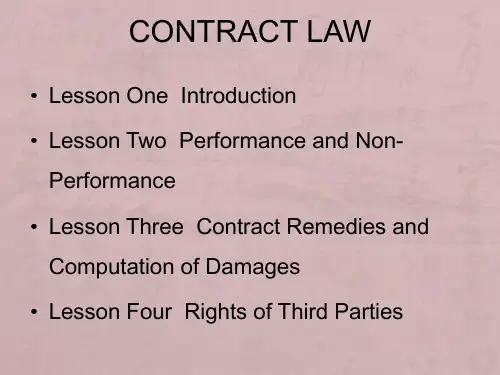
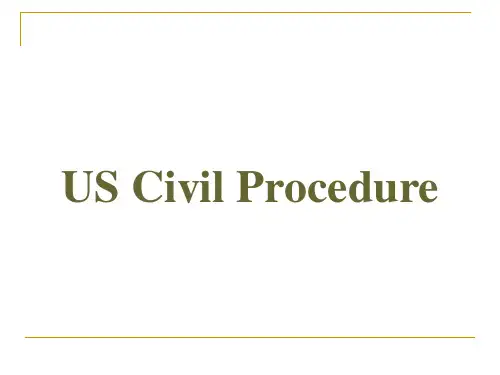

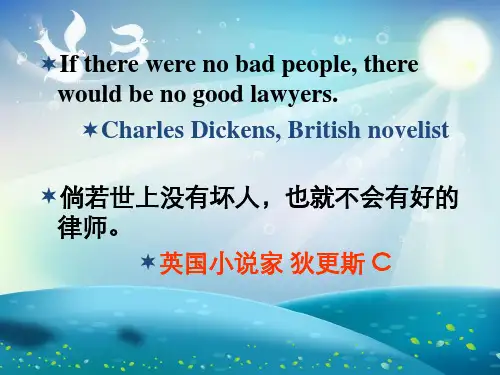
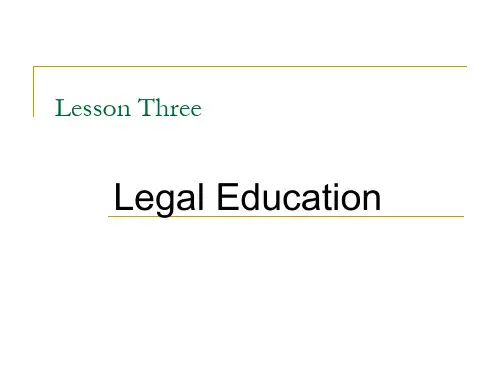
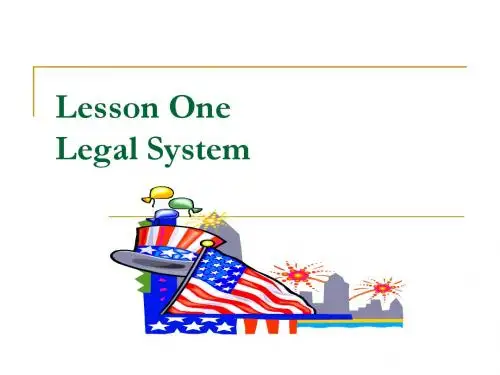

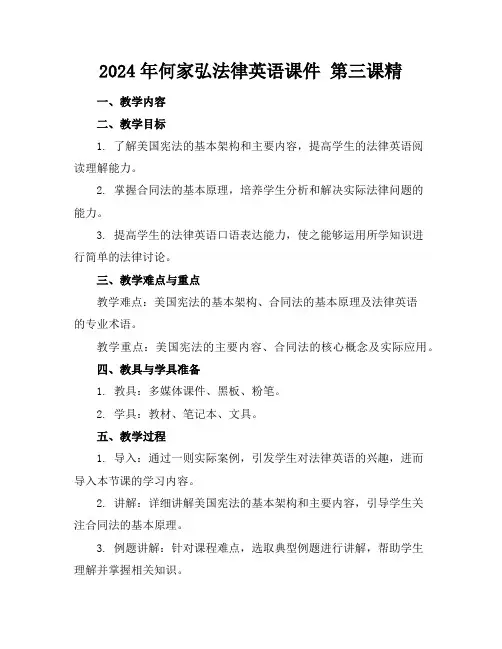
2024年何家弘法律英语课件第三课精一、教学内容二、教学目标1. 了解美国宪法的基本架构和主要内容,提高学生的法律英语阅读理解能力。
2. 掌握合同法的基本原理,培养学生分析和解决实际法律问题的能力。
3. 提高学生的法律英语口语表达能力,使之能够运用所学知识进行简单的法律讨论。
三、教学难点与重点教学难点:美国宪法的基本架构、合同法的基本原理及法律英语的专业术语。
教学重点:美国宪法的主要内容、合同法的核心概念及实际应用。
四、教具与学具准备1. 教具:多媒体课件、黑板、粉笔。
2. 学具:教材、笔记本、文具。
五、教学过程1. 导入:通过一则实际案例,引发学生对法律英语的兴趣,进而导入本节课的学习内容。
2. 讲解:详细讲解美国宪法的基本架构和主要内容,引导学生关注合同法的基本原理。
3. 例题讲解:针对课程难点,选取典型例题进行讲解,帮助学生理解并掌握相关知识。
4. 随堂练习:设计相关练习题,让学生在课堂上即时巩固所学知识。
5. 小组讨论:分组讨论案例,培养学生的法律英语口语表达能力及团队合作精神。
六、板书设计1. 美国宪法概述基本架构主要内容2. 合同法基本原理核心概念要素违约责任七、作业设计1. 作业题目:1)美国宪法的基本架构是什么?2)合同法的核心概念有哪些?1)The Constitution of the United States providesthe framework for the American government.2)A contract is an agreement between two or more parties that creates legal obligations.2. 答案:1)美国宪法的基本架构包括三权分立、联邦制、权力制衡等。
2)合同法的核心概念包括要约、承诺、对价、意图等。
翻译答案略。
八、课后反思及拓展延伸法律英语教材:《法律英语阅读与翻译》、《法律英语写作》等。
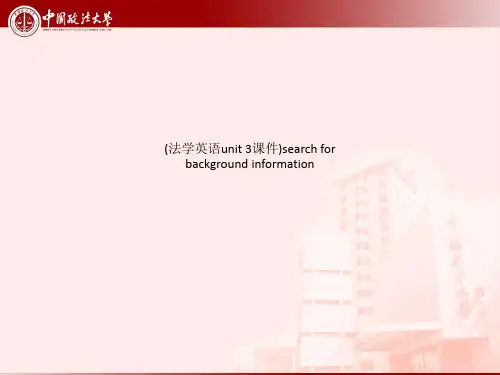
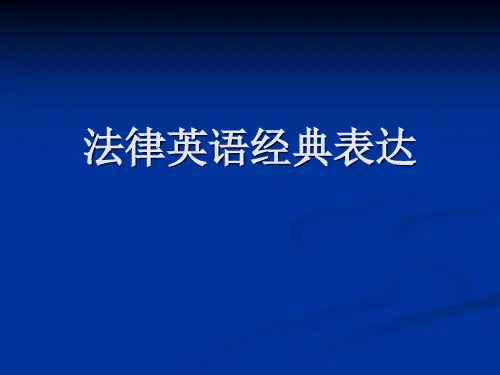
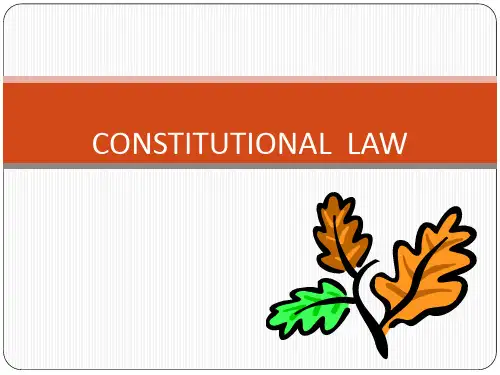
1.In a contractual relationship, how does one communicate an offer?A.By conduct.B. In writing.C. Orally.D. All of the above.E. None of the above.2.Professor Smith addressed his class one day with the following: “I will award any student 10bonus marks if he or she paints the walls of my office.” Most of the students giggle, and no student says anything to Smith. Later in the term, Jenny, desperate for a higher grade, obtains the keys to Professor Smith’s office from his secretary and proceeds to paint 3 walls of the office before she must leave for a class. How many marks must Professor Smith award her for her work?A.7.5, because she substantially completed what was required of her under the terms of Smith’s offer,but she should not be compensated to a greater extent than what she actually performed.B.0, because she never told Smith she would accept his offer.C.10, because she substantially completed what was required of her under the terms of Smith’s offer.D.0, because she neither verbally accepted Smith’s offer, nor did she complete all of her obligations inorder to accept the unilateral contract.E.0, because no reasonable student would have taken Smith’s “offer” seriously.3.Professor Smith addressed his class one day with the following: “I will award any s tudent 10bonus marks if he or she paints the walls of my office.” Most of the students giggle, and no student says anything to Smith. Later in the term, Jenny, desperate for a higher grade, obtains the keys to Professor Smith’s office from his secretary a nd proceeds to paint the 4 walls of his office. Smith arrives at his office just as she is finishing, and demands to know why Jenny is in his office and why she is painting his office such a “hideous” colour. She tells him that she was merely accepting his offer. How many marks is Jenny entitled to?A.0, because she never verbally accepted Smith’s offer.B.10, because Jenny has enriched Smith by the amount of her painting services.C.10, because she substantially completed what was required of her under the terms of Smith’s offer.D.0, because in order to be enforceable, a contract such as this would have had to be in writing.E.Maybe 10 marks or maybe 0 marks, depending on an assessment as to whether a reasonable personin Jenny’s position would have reasonably relied on Smith’s statement as a binding offer to enter a contract.4.Penny sent a letter to Victor offering to buy his house for $150 000. Two days later, on Tuesdaythe 29th, Victor sent a letter back stating he would sell the house for $160 000. Victor's letter was received by Penny on Friday the 1st. On Tuesday the 5th, Penny mailed a letter to Victor accepting the offer, with the letter being received by Victor on Thursday the 7th. However, on Saturday the 2nd, Victor had agreed to sell the house to Trent for $170 000; on the same day he mailed a letter to Penny revoking his offer. The letter of revocation is received by Penny on Wednesday the 6th. To whom is Victor legally bound to sell his house?A.With Trent because Victor's letter of revocation was received before Penny's letter of acceptance wasreceived.B.With Penny because Victor had no right to negotiate with Trent after he had sent his offer to Penny.C.With Trent because Victor's letter of revocation was mailed before Penny's letter of acceptance wasmailed.D.With Penny because her letter of acceptance was mailed before the letter of revocation was received.E.With Trent because that contract was concluded first.5.On June 3, Sam offered to sell Patty his cottage for $80 000. The offer did not include an expirydate, but in it Sam indicated that he was short of cash and needed to sell the cottage within two weeks or he would be forced into bankruptcy. On June 18, Patty sent Sam a letter by couriersaying she accepted his offer, had arranged financing, and was ready to close the deal in two days. George sent a message back that he had sold the cottage on June 10 to Tate. Can Patty sue Sam for breach of contract?A.No, because Sam's statement was just an invitation to treat so it could not be accepted.B.No, because Sam revoked the offer to Patty when he agreed to sell the cottage to Tate.C.Yes, because Sam never revoked the offer to Patty.D.No, because Sam's offer to Patty had lapsed.6.Bill has advertised in the local newspaper that he will sell his 5 year old car. The advertisementdescribes the car in some detail, but lists no offering price. Jim calls the telephone number Bill has included in the ad, and not getting an answer, leaves the following message on voice mail: “Bill, I, Jim, will buy your car for $5000. I live at 123 Main Street. Please drive the car to my house next Tuesday the 15th at 7:00 p.m. and I will give you a cheque. If you have any difficulties with this, please call me.” Bill never shows up at Jim’s house on the night of the 15th.When Jim calls him on the morning of the 16th, Bill tells him that he sold the car to Joyce for $5500 two days earlier. Can Jim sue Bill for breach of contract?A.No, because Jim’s acceptance of Bill’s offer was not in writing.B.No, because Jim never accepted Bill’s offer.C.No, b ecause Jim never accepted Bill’s offer.D.No, because Bill’s ad was an invitation to people like Jim to make offers to buy the car and Bill neveraccepted Jim’s offer.E.Yes, because Jim accepted Bill’s offer before he could revoke it and sell to Joyce.7.On October 12, Frank wrote to Jane asking at what price she would be willing to sell her house.Jane wrote back on the 14th, stating the asking price was $75 000. On the 16th, Frank wrote back and asked, "Would you take $50 000?" On the 20th, Jane replied, "I won't go lower than $70 000." On the 25th, the letter from Frank stated, "You've got a deal at $68 000." On the 26th, Jane called Frank and agreed to $68 000. How would each communication be described?A.12th - invitation to treat; 14th - offer; 16th - counter-offer; 20th - counter-offer; 25th - counter-offer;26th - acceptance.B.12th - invitation to treat; 14th - offer; 16th - revocation; 20th - offer; 25th - counter-offer; 26th -acceptance.C.12th - offer; 14th - invitation to treat; 16th - offer; 20th - counter-offer; 25th - counter-offer; 26th -acceptance.D.12th - invitation to treat; 14th - offer; 16th - counter-offer; 20th - revocation; 25th - offer; 26th -counter-offer.E.12th - offer; 14th - invitation to treat; 16th - offer; 20th - counter-offer; 25th - revocation; 26th -acceptance.8.In early October, Irene buys a ticket on Confederation Airlines to fly home from Toronto toCalgary on December 12, the day after her only scheduled final exam. Irene learns on November29 that her exam, originally scheduled for December 11, has now been rescheduled to December17 because of a conflict. Irene contacts Confederation Airlines to change her flight and is toldthat one of the terms of purchase—printed in small print on the ticket she received from the airline—provides that she cannot cancel her ticket more than 30 days after purchase. She therefore must pay for a second ticket for a flight to Calgary leaving Toronto on December 18.Does she have a right to demand her money back for the first ticket?A.Yes, because she never read the term limiting the time for refunds.B.No, the terms of the contract clearly state she cannot get her money back more than 30 days after itspurchase.C.Yes, because airlines are not permitted to use standard form terms pre-printed on their tickets.D.Yes, because this was an unusual or unexpected term that was not highlighted to her when shereceived the ticket.E.Yes, because the term limiting the time for refunds was unfair.9.ABC Developments Inc. is planning to build a set of townhouses on a downtown lot that ispartially vacant, and partially occupied by 6 property owners. In order to complete the project as planned, ABC needs all of the owners of the occupied lots to sell their land to it. ABC has had the experience that once property owners know that a developer requires a number of lots, they hold out for a higher price, knowing that their land is that much more valuable to the developer.What is the best way for ABC to ensure that it is able to purchase all of the lots and at a reasonable price?A.Enter into contracts with each owner who agrees and hope that no one holds out.B.Ask each owner to make ABC an offer and then accept none of them until every owner has made anoffer.C.Make an offer to each owner and do not acknowledge any acceptance until acceptances are receivedfrom every owner.D.Enter into contracts with each owner who agrees and ask each owner not to tell their neighboursabout the deal.E.Enter into an option with each owner that is not exercised until every owner has agreed to theoption.10.On October 25, Geraldine said to Peter that she would pay him $250 if he would rake all of theleaves in her yard. On October 26, Peter starts raking the leaves, finishing on October 29. He then asks Geraldine for the $250. Geraldine refuses to pay Peter and thanks him for the gift of the raking. Can Peter force Geraldine to pay him?A.No, because Peter never communicated his acceptance of the offer to Geraldine.B.Yes, because Peter's conduct in raking all of the leaves amounted to communication of acceptance.C.No, because Geraldine's offer had lapsed so could not be accepted.D.No, because Geraldine's statement was merely an invitation to treat.E.Yes, because an owner of a house has to pay anybody who does work on the house.11.The City of Kingston needs extensive r oad work done and publishes a “Request for Tenders” ina local newspaper. In response, three local construction firms submit tenders, and all of thetenders address all of the issues raised in the City’s Request for Tenders. The City decides to award the contract to a firm from Toronto it has heard does good work. The contract price agreed to is more than the bids of all three local firms that submitted tenders. It is revealed that the City never considered the tenders of the local firms. What should the local firms do in response to the City’s actions?A.Nothing. Their tenders were invitations to the City to make offers to the local firms on the termssuggested in their tenders.B.Nothing. Their tenders were merely offers that the City never accepted.C.They could all sue for breach of contract as there is an implied contract that all bids submittedpursuant to a tender request will be considered.D.Nothing, it is the City’s prerogative to choose whatever contractors it wishes.E.The firm with the lowest priced bid should sue for breach of contract because it should have beenselected.12.How may an offer lapse?A.When the offeree fails to accept within a time specified in the offer.B.When the offeree fails to accept within a reasonable time, if the offer has not specified any time limit.C.When either of the parties die or becomes insane prior to acceptance.D.All of the above.E.None of the above.13.How can an offeree bind an offeror to keep its offer open for a specified time?A.The offeree may obtain a written offer under seal.B.The offeror and offeree exchange promises to perform.C.The offeree may make a contract called an option to keep the offer open.D.The offeree must perform both requirements stated in answers A and C.E.The offeree must perform the requirements set out in either answer A or answer C.14.How can an offer "come to an end"?A.The offer may lapse when the offeree fails to accept within the time stated in the offer, or if no timelimit is stated, within a reasonable time.B.The offerer revokes the offer before the offeree has accepted.C.The offerer rejects the offer or makes a counter-offer.D.The offeree accepts before any of the three above has occurred (offer ends and a contract is formed).E.All of the above.15.Under what circumstances has an offeree counter-offered?A.Through silence.B.Through performance of the terms.C.When the offeree receives an offer and, though interested, chooses to change some of the termsD.All of the above.16.Maxine, a wealthy widow, was approached by her alma mater university for a donation that theschool intended to use to construct a residence for women. Maxine offered to donate an amount that would cover fifty percent of the capital required for the building. If Maxine were to later refuse to fulfill the pledge, could the university force her to pay?A.Yes, because Maxine has a moral obligation to fulfill the pledge.B.No, because the university does not need a women’s residence.C.Yes, if the university can show that they commenced construction of the residence in reliance onMaxine's pledge.D.No, because Maxine's pledge is merely a gratuitous promise.E.Yes, because all the essential elements of a contract are present—offer, acceptance, andconsideration.17.Scott offered to shovel snow from Trisha’s driveway after she sprained her ankle late in January.For the remainder of January and throughout February, true to his word, Scott shoveled her driveway approximately five times. On March 1, when Trisha’s ankle had sufficiently healed and she was able to look after her driveway again, Trisha told Scott how thankful she was for his efforts and that she would give him $20 for each time he shoveled her driveway (or a total of $100). Scott accepted Trisha's offer, but later Trisha refused to pay the $100. Can Scott force Trisha to pay?A.No, because $20 is too much for shoveling snow.B.Yes, because all the essential elements of a contract are present—offer, acceptance, andconsideration.C.Yes, because Scott changed his course of action and shoveled her snow thinking that he might bepaid.D.No, because Trisha's promise is merely a gratuitous promise since the consideration is in the past.E.Yes, because Trisha has a moral obligation to fulfill the promise.18.Betty asked her friend Marnie, an accountant, if she could help her with her tax return. Marnieowed Betty $300, and offered to help Betty if Betty would agree to forgive Marnie’s debt to her.Betty agreed and Marnie helped Betty prepare her tax return, which resulted in a $2 000 refund.A month later, Betty called Marnie and asked her to repay the $300; Marnie refused, citing the“deal about the tax return.” Betty replied: “That was no deal. I’ll see you in Small Claims Court!” If Betty presses ahead with her case, what will the court say?A.There was no consideration here—it was an example of past consideration.B.There was no consideration here—consideration must be paid, not a promise not to do something.C.This was a gratuitous reduction of a debt and not enforceable; Marnie still owes the debt.D.There was a binding contract, and as consideration for the tax services, Betty agreed to forgiveMarnie’s debt.E.The forgiveness of the debt could have been consideration, but the amount of the debt far exceededthe value of the services and therefore the consideration was inadequate.19.Alomar rescued Bell’s son from a burning building. Afterwards, Bel l promised to pay Alomar$5000 out of gratitude. If Bell refuses to pay, can Alomar force him to?A.No, because the consideration is out of proportion to the labour or act required.B.No, because the labour or act was done before the promise to pay was made an d thus was “pastconsideration.”C.Yes, because the consideration is not out of proportion to the labour or act required.D.No, because the act was done—or the consideration was paid—to Bell’s son and not to Bell.E.Yes, because all the essential terms of a contract are present—offer, acceptance, and consideration.20.Dennis had Sean repair his sports car and on January 31, Sean sent him a bill for $2500. Dennispaid $1500 and owes Sean $1000, due on March 1. On February 28, Dennis is a little short of cash so he asks Sean to accept $900 in satisfaction of the debt. Sean accepts the $900 and two days later commences a lawsuit against Dennis for the remaining $100. Can Sean succeed in the lawsuit?A.Yes, because Dennis has not fulfilled his obligations since the full amount was not paid.B.Yes, because $900 is not adequate consideration for a $1000 debt.C.No, because accepting the money one day early is consideration for the reduction.D.Yes, because terms of a contract cannot be varied once the agreement is signed.E.No, because Dennis relied on Sean's agreement to accept $900.21.The Kingston Hospital solicits pledges from any person visiting friends or relatives in thehospital, to help finance the construction of a new wing. Fred is so happy with the care his mother has received at KH that he completes and signs a pledge card indicating that he intends to give $20 000 to the hospital. Fred never donates the money. Can the hospital sue him in order to receive that money?A.Yes. Fred is in breach of a properly formed contract.B.Yes. While charitable pledges ordinarily are not enforceable, when they are in writing and signed, theyare enforceable.C.No. Charitable organizations are not permitted to sue donors.D.No. When Fred made the pledge he was incapable of making a rational decision because of hiseuphoria over his mother’s recovery.E.No, this is a gratuitous promise and not enforceable against Fred.22.Assume the same set of facts as were set out in Question #7. In this case, however, when Fredhands his pledge card to the Kingston Hosp ital’s charitable officer, the officer says: “Oh thank you Fred. With this kind donation we can hire architects to design the new wing.” The hospital later that day signs a contract with a local architectural firm and the architects immediately begin working on plans. Fred never makes the donation and the architectural firm has billed the hospital for $18 000 worth of services. In this case, can the hospital successfully sue Fred for the money?A.Very likely, so long as it can show that a reasonable person in Fred’s place would have understoodthat the hospital was relying on his promise to undertake further obligationsB.No, this is a gratuitous promise and not enforceable against Fred.C.Yes. While charitable pledges ordinarily are not enforceable, when they are in writing and signed,they are enforceable.D.No. Charitable organizations are not permitted to sue donors.E.No. When Fred made the pledge he was incapable of making a rational decision because of hiseuphoria over his mother’s recovery.23.Ben asked an investment advisor, Sherry, for advice concerning the appropriate composition ofhis portfolio. After the advice was provided, Ben asked Sherry her fee and Sherry suggested a reasonable sum. Ben refused to pay the figure. Can Sherry successfully sue Ben for the sum mentioned?A.Yes, because a reasonable payment is required when there has been a request for services.B.No, because Ben and Sherry had no intention to create legal relations.C.No, because Sherry's provision of investment advice was a gratuitous service.D.No, because past consideration is no consideration.E.Yes, because the essential elements of a contract are present—offer, acceptance, and consideration.24.What is the classic situation in which equitable estoppel arises?A.The other party in reliance on that promise alters his conduct in a way that would make it a realhardship if the promisor could renege on his promise.B.Some form of legal relationship already exists between the parties.C.One of the parties promises (perhaps by implication only) to release the other. From some or all ofthe other's legal duties to him.D.None of the above.E.All of the above.25.John, who has just ordered a new playground set for his children, tells his friend Irene that hewill give her his old smaller swingset as soon as the new playground set arrives. To make room for the swingset, Irene will have to have five trees cleared from her backyard, and engages a firm to do this work at a cost of $1 200. Subsequently, John's brother reminds him that he had promised the old swingset to him, and rather than promote a family quarrel, John tells Irene she cannot have the swingset. Can Irene successfully sue John?A.Yes, because Iris reasonably relied on John's promise to her detriment and incurred significantreliance costs.B.Yes, because the contract between John and Iris had all the essential elements—offer, acceptance,and consideration.C.No, because past consideration is no consideration.D.No, because the promise to John's brother was made first.26.At their children’s soccer game one summer evening, Sue and Ted are discussing Sue’s plan toconvert part of her house into a retail store. Ted, a property lawyer, tells Sue that a recently enacted city by-law will not permit her customers to access her store through a front door,contrary to her plan. She thanks him profusely for his advice and the next day advises the contractors to alter their plans. Two days later, Sue receives a bill for professional services from Ted for $200. Does Sue have to pay this bill?A.No. Professional advice rendered in social situations can never be considered as billable.B.Yes, based on the principle of quantum meruit.C.Yes, she benefited from Ted’s advice and has a moral duty to pay it.D.She has no duty under contract law to pay this bill, but she does have a duty in tort to pay aprofessional for his services.E.No, as there was no implication from their conversation that she was requesting this opinion, it wasgiven gratuitously.27. A promise made in the absence of a bargain is:A. Consideration.B. Promissory estoppel.C. Gratuitous promise.D. Past consideration.E. None of theabove.28. A unilateral contract means:A.The price for which the promise [or act] of the other is bought.B.The price paid for the offeror's promise is the act done by the offeree.C.The price paid for each party's promise is the promise of the other.D.All of the above.E.None of the above.29.What are the elements required to form a binding contract?A.The defendant had the capacity to form a binding contract.B.AcceptanceC.The contract is legalD.OfferE.Consideration for the promiseF.All of above30.Jen leaves her bicycle at Joe’s for 2 weeks for repairs, and in the interim, she celebrates her 18thbirthday. She then picks up her repaired bike, but does not pay. Can Joe successfully sue her in this case?A.Yes, because she is no longer a minor and therefore the contract is enforceableB.No, because this was not a contract for a “necessary."C.No, because on attaining the age of majority, she did not ratify the contract she had entered into as aminor.D.Yes, because this is a contract of a continuous nature and she did not repudiate her liability uponturning 18.E.No, because she was a minor when she entered the contract and it can never subsequently be bindingagainst her.31.At 17 years of age, Wilma entered into a contract of employment with a large retail clothingoutlet to join its one-year training program. The program included travel to the company’s head office in Toronto and several of its stores across Canada, for promising young employees.Shortly after Wilma went to work for the company, it proposed to send her to work in its largest store in Saskatoon for a few months as part of the training program, at her regular salary. If Wilma refuses to go, can the company successfully sue her?A.Yes, because it is part of a beneficial contract of service.B.No, because it is part of an exploitive contract of service.C.Yes, because it is part of a contract for “necessaries."D.Yes, because it is a contract of an ongoing or continuous nature.E.No, because it is part of a contract for non-necessaries of life.32.Sally, a 17-year-old, is desperate for a car so that she can obtain a job delivering pizzas. Sheborrows $2 000 from an adult family friend to buy a used car. If Sally fails to repay the debt, can the family friend successfully sue Sally for the debt?A.No, because the loaning of money is not a necessary.B.Yes, because the money was used to purchase a non-necessary item.C.No, because the money was used to purchase a car that was necessary for her employment.D.No, because not all the essential elements of a contract are present —offer, acceptance andconsideration.E.Yes, because the loaning of money is a necessary.33.In order to become a licensed electrician, 16-year-old Josh must work with a licensed electricianfor a period of 1 year. He has some difficulty finding an experienced electrician who will hire him for this training period, but finally enters into an agreement with Barney, an older electrical contractor. Barney’s business is rather slow, and he is unable to pay Josh very well. Two months later, Josh learns that two of his friends are apprenticing for electricians and making twice as much money per hour as Josh is. Josh wants to break his agreement with Barney, but Barney has come to rely on Josh. Can Josh repudiate this contract?A.Unlikely, because this appears to be a contract of service beneficial to Josh in that it allows Josh tomeet the requirements of his profession.B.No, because this contract is not beneficial to Josh, it is beneficial to Barney.C.Yes, as a minor he can repudiate any contract while still under the age of majority.D.Yes, it is illegal to employ minors to contracts for professional services.E.No, he cannot repudiate it until he is 18 and the contract will be over before that time.34.Ron, a 15-year-old hockey enthusiast, was surfing the Internet one evening looking for rarehockey cards. He finds a site selling what he is looking for and using the online purchase form, agrees to purchase a Wayne Gretzky rookie card and three Russian-produced cards of prominent hockey stars. He agrees to pay $600 for the 4 cards, which is to be paid “on delivery."The next day, Ron spends $600 on other hockey cards of interest he discovers in a local card store. When the internet-ordered cards arrive, Ron determines that he has already spent all of his money on the cards he found in the store and refuses to pay the delivery person. Can the online seller sue Ron for breach of contract?A.No, the contract was neither a beneficial contract of services nor a contract for necessaries andtherefore is not enforceable against the minor.B.No, the proper elements of contract formation were not present.C.Yes, because Ron cannot repudiate after the purchased cards have been delivered.D.Yes, there is no way that the online card seller could have known that Ron was a minor and thereforethe contract is enforceable.E.Yes, but only if Ron stated on the form that he was at least 18 years of age.35.Ron, a 70-year-old hockey enthusiast who suffers from mild Alzheimer’s disease, was surfing theInternet one evening looking for rare hockey cards. He finds a site selling what he is looking for and using the online purchase form, agrees to purchase a Wayne Gretzky rookie card and three Russian-produced cards of prominent hockey stars. He agrees to pay $600 for the 4 cards, which is to be paid “o n delivery." When the internet-ordered cards arrive several days later, Ron has no recollection of making such a purchase and refuses to pay the delivery person. Can the online seller sue Ron for breach of contract?。
法律英语课件Law English CoursewareIntroductionIn today's globalized world, the importance of legal professionals proficient in English cannot be overstated. As the legal field increasingly interacts with international counterparts, it is crucial to have a strong grasp of legal English to effectively communicate and understand legal concepts. This courseware aims to enhance your knowledge and skills in the field of legal English by providing comprehensive lessons and interactive exercises.Lesson 1: Legal TerminologyUnderstanding legal terminology is essential in comprehending and drafting legal documents accurately. This lesson will cover a wide range of commonly used legal terms and their definitions. Each term will be presented in context, allowing you to grasp their proper usage.Lesson 2: Legal WritingEffective legal writing is precise, concise, and unambiguous. This lesson will focus on honing your skills in drafting legal documents, such as contracts, pleadings, and legal opinions, by examining the fundamental principles of legal writing in English. Key areas of emphasis include logical organization, clarity, and use of appropriate language.Lesson 3: Legal ResearchBeing adept at conducting legal research is a fundamental skill for any legal practitioner. This lesson will guide you through the intricacies of legalresearch in English, including locating primary and secondary sources, utilizing online databases, and critically analyzing and synthesizing legal information.Lesson 4: Contract LawContracts form the backbone of business transactions and legal relationships. This lesson will delve into the essential elements of contract law, including offer and acceptance, consideration, and terms and conditions. Additionally, the lesson will cover the drafting of contracts using clear and unambiguous language to ensure enforceability.Lesson 5: Intellectual Property LawWith the rapid advancement of technology, the protection of intellectual property rights is of utmost importance. This lesson will explore the basicsof intellectual property law, including copyrights, trademarks, and patents. It will provide an overview of the legal framework governing intellectual property and the measures required to safeguard these rights.Lesson 6: Dispute ResolutionResolving disputes through litigation or alternative methods is a significant aspect of the legal profession. This lesson will introduce you to the different methods of dispute resolution, including litigation, arbitration, and mediation. It will also address the use of legal English in presenting arguments and negotiating settlements.ConclusionThe ability to navigate the complexities of legal English is indispensable for lawyers, legal scholars, and students aspiring to enter the legal profession. This courseware aims to equip you with the necessary knowledge and skills to excel in this field. By enhancing your understanding of legal terminology, legal writing, legal research, contract law, intellectual property law, and dispute resolution, you will be well-prepared to communicate effectively and navigate the global legal landscape with confidence.Remember, continuous practice and engagement with the material will solidify your grasp of legal English. Embrace the opportunity to develop your proficiency in this vital area, and it will undoubtedly open doors to a successful legal career.。